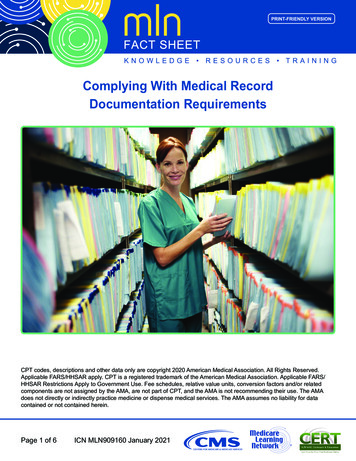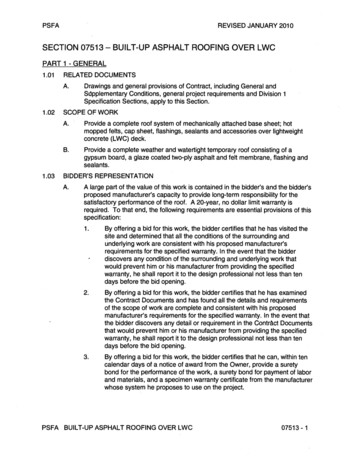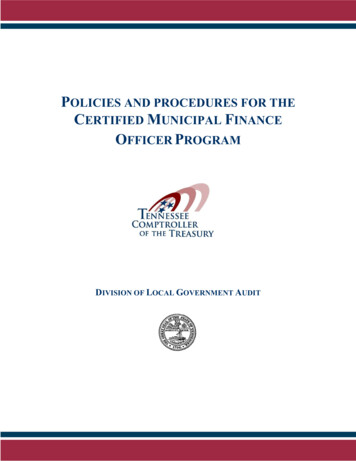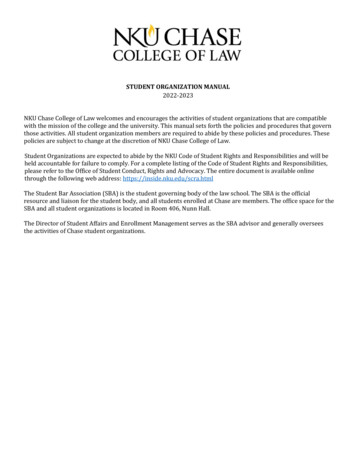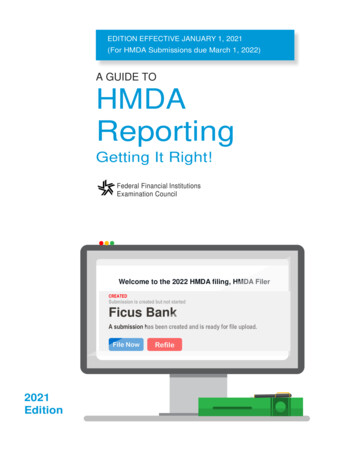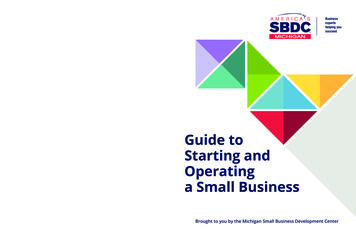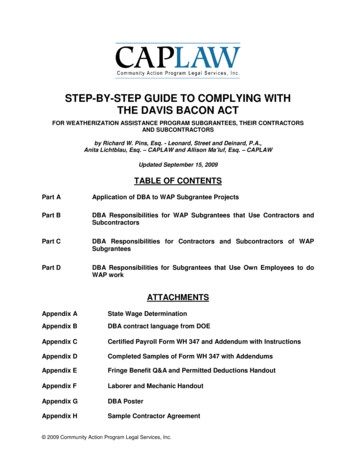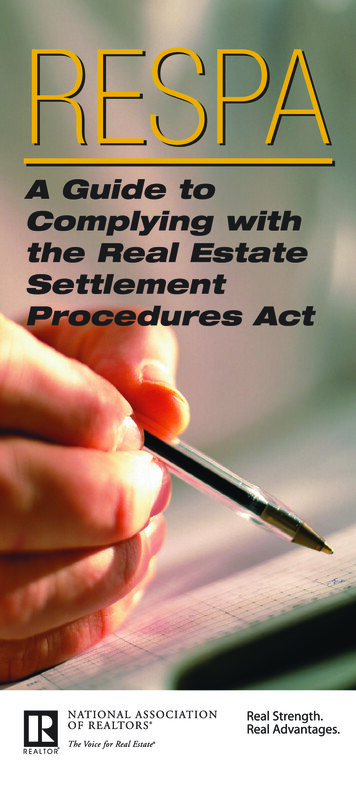
Transcription
RESPAA Guide toComplying withthe Real EstateSettlementProcedures Act
For a complete listing of the business solutions offeredfrom the NATIONAL ASSOCIATION OF REALTORS ,visit us online at www.REALTOR.org/Store.To receive NAR product updates and specials, send youremail address to: narprod@realtors.org
RESPAA Guide toComplying withthe Real EstateSettlementProcedures Act 2005 NATIONAL ASSOCIATION OF REALTORS All rights reserved.
REGULATORY AND INDUSTRY RELATIONSThe NAR Regulatory and Industry Relations Department isthe vehicle for representing REALTORS and the real estateindustry in today’s changing regulatory businessenvironment. The Department’s focus includes: Housing,Financial, Business, Commercial and EnvironmentalAffairs; Industry Relations; and Housing Opportunities.The group’s mission is to enhance NAR’s regulatory policypresence in Washington D.C., establish and coordinateformal relations with pertinent industry organizations andgroups, and conduct long-term policy analysis, with specialemphasis on how the real estate industry will be affectedby federal regulations. This mission elevates theAssociation’s regulatory and industry relations efforts tounprecedented levels.
TABLE OFCONTENTSINTRODUCTION .5PART 1Scope of RESPA .7Anti-Kickback ProvisionsSection 8(a).8Prohibition Against Referral FeesSection 8(b).10Prohibition Against SplittingUnearned FeesSection 8(c).11Exceptions to the Anti-KickbackProhibitionsSection 8(d).18Enforcement of Section 8PART 2RESPA Questions and Answers .22GLOSSARY .28FEDERAL INFORMATION RESOURCES .323
INTRODUCTIONIn 1974, Congress enacted the Real EstateSettlement Procedures Act (RESPA) as aconsumer disclosure and anti-kickback statute.As a result, RESPA serves four primarypurposes:RESPA requires disclosures that listsettlement costs to be given tohomebuyers and sellers.RESPA eliminates abusive practices,such as kickbacks and referral fees,which increase the costs paid byconsumers.RESPA reduces the amounts thathomebuyers must place in escrowaccounts.RESPA reforms and modernizes localrecordkeeping and land title information.This guide is designed to provide anintroduction to RESPA’s requirements andprohibitions affecting real estate brokers andagents. Part 1 of this guide briefly explains thescope of the Act, the general prohibition onkickbacks and referral fees under Section 8 ofRESPA, exceptions to Section 8, penaltiesavailable for RESPA violations, and significantenforcement actions settled by the U.S.Department of Housing and UrbanDevelopment (HUD or Department). Part 2contains examples of activities permitted andnot permitted under Section 8 of RESPA.Please be aware that RESPA requires certainconsumer disclosures, including a HUD-1Settlement Statement, a Good Faith Estimate,Special Information Booklets, Transfer ofServicing notices, and Escrow Accountstatements. Since real estate brokers and5
agents are not responsible for providing thesedisclosures, this guide does not review thedisclosure requirements under RESPA.Moreover, please be aware that many stateshave enacted laws with similar prohibitions andconsumer protections as provided underRESPA. This guide discusses only the federalrequirements of RESPA and does not take intoconsideration any additional regulations thatmay have been imposed on the state level. It ispossible that state laws may prohibit activitiesthat are permissible under RESPA, and werecommend that you consult with a RESPAattorney to ensure that you comply with allapplicable laws. This guide is not intended toprovide you with legal advice as to the mattersdiscussed herein.The NATIONAL ASSOCIATION OF REALTORS acknowledges the contribution made to thisguide by:Phillip L. Schulman, Esq.Kirkpatrick & Lockhart Nicholson Graham LLP1800 Massachusetts Avenue, NW, Suite 200Washington, DC 20036(202) 778-9000 / www.klng.com6
PART 1SCOPE OF RESPARESPA applies to settlement services.*Settlement services are provided by settlementservice providers. Settlement services arethings associated with the purchase of a homethat occur at or before settlement. If the serviceoccurs after settlement, it is generally notconsidered a settlement service. Settlementservices include the following:Real estate broker or agent servicesServices related to the issuance of atitle insurance policyOrigination of a mortgage loanServices rendered by a mortgage brokerServices related to origination,processing, or funding of a mortgage loanServices rendered by an attorneyDocument preparation, includingnotarization, delivery, and recordationRendering credit reports and appraisalsRendering inspectionsSettlement or closingServices involving hazard, flood, or othercasualty insurance or homeowners’warrantiesServices involving real property taxesor other assessments or charges onreal propertyAny other services that a settlementservice provider requires a borrower topay for before or at closing*Terms appearing in italics are further defined in the Glossaryto this guide.7
RESPA, therefore, governs the activities of aperson or entity that provides any of theservices listed above, including real estatebrokers and agents.RESPA does not apply to: Transactions that are primarily for business,commercial, or agricultural purposes Government or governmental agencies orinstrumentalities Temporary financings Secondary market transactionsANTI-KICKBACKPROVISIONSSection 8 of RESPA prohibits referral fees andkickbacks to settlement service providersbecause these fees raise the cost of services toconsumers. Section 8 is divided into four parts: Section 8(a) prohibits referral fees Section 8(b) prohibits the splitting ofunearned fees Section 8(c) lists exceptions to theprohibitions in Sections 8(a) and (b) Section 8(d) governs the enforcement ofRESPASection 8(a) – Prohibition AgainstReferral FeesSection 8(a) prohibits a person from giving orreceiving any fee, kickback, or thing of valuepursuant to any written or oral agreement orunderstanding that business involving a realestate settlement service and a federally relatedmortgage loan will be referred to any person.8
Four elements are required for a Section 8(a)violation:1. A settlement service involving a federallyrelated mortgage loan. RESPA defines afederally related mortgage loan as a loansecured by a first or subordinate lien on aone-to-four family residential dwelling(including manufactured homes) that meetscertain other criteria. A federally relatedmortgage loan means any loan that placesa lien on a one-to-four family property andincludes both government-insured andconventional mortgage loans.2. A referral of business incident to or part ofa settlement service pursuant to anagreement or understandingPlease be aware that the agreement orunderstanding does not have to be writtenor verbalized, but may be established bypractice, pattern, or course of conduct.3. Payment or receipt of a fee or thing ofvalueHUD’s regulations provide that a fee orthing of value is virtually anything onereceives in consideration for referring asettlement service, including, but notlimited to: Money or feesDiscountsDuplicate payments of a chargeStock, dividends, distribution of profitsCredits representing money that may bepaid at a future dateOpportunity to participate in a moneymaking programRetained or increased earningsIncreased equity in a parent or subsidiaryentitySpecial bank deposits or accounts, orspecial or unusual banking termsServices of all types at special or free rates9
Lease or rental payments based in wholeor in part on the amount of businessreferred Trips and payment of another person’sexpenses Reduction in credit against an existingobligation4. For the referral of settlement servicebusinessSection 8(b) – Prohibition AgainstSplitting Unearned FeesIn addition to the prohibition on kickbacks andreferral fees, RESPA prohibits a person fromgiving and receiving any portion, split, orpercentage of any fee charged or received for areal estate settlement service in connectionwith a federally related mortgage loan, unlessthe portion of the fee is for services actuallyperformed.Three elements are required for a Section 8(b)violation: A settlement service involving a federallyrelated mortgage loan A split of an unearned fee between two ormore parties or a mark-up of an unearned fee A payment for the referral of business, ratherthan for services actually performedSome federal circuit courts have interpretedSection 8(b) differently from HUD. The Seventh,Fourth, and Eighth Circuits have concluded thatSection 8(b) requires an actual split of theunearned portion of a fee between two or moreparties in order for a Section 8(b) violation tooccur. For example, a lender orders a creditreport, which costs 15. The lender chargesthe consumer 25 for the credit report, paysthe credit bureau 15 for the cost of the reportand retains the 10 excess. The lender thenpays the real estate agent who referred theconsumer 5 from the 10 excess. In this10
example, the 10 represents the unearnedportion of a credit report fee, and the 5payment to the agent qualifies as an actual splitin violation of RESPA.HUD, however, does not require a split of a feeto find a Section 8(b) violation, and theEleventh, Second, and Third Circuits haveagreed with HUD. HUD issued a policystatement, which describes three scenarioswhere a Section 8(b) violation would occur: Two or more persons split a fee and oneperson did not perform any services toreceive a share of the fee One person marks up the cost of a thirdparty service and keeps the differencewithout providing any goods or services tojustify the additional charge One person charges a fee for no, nominal orduplicative work, or a fee that exceeds thevalue of the goods or services providedUsing the example above, HUD would take theposition that the lender’s mark up of a 15credit report fee to 25, and retention of the 10 extra, is all that is required to constitute aviolation of Section 8(b).Section 8(c) – Exceptions to theAnti-Kickback ProhibitionsDespite the prohibitions in Section 8 of RESPA,Congress understood that a number ofbusiness referrals that occur in the settlementservice industry do not harm consumers. As aresult, Congress permitted certain conduct tobe exempt from RESPA and HUD’s scrutiny. If afee or thing of value is paid under one of theseexceptions, the person or entity does notviolate RESPA. These exceptions are listed onthe next page.11
1. Cooperative agreements betweenlisting and selling real estate brokersThis exception refers only to fee divisionswithin real estate brokerage arrangementswhen all parties are acting in a real estatebrokerage capacity. Please be aware thatthis exception has no applicability to feearrangements between real estate brokersand mortgage brokers, or betweenmortgage brokers.2. Payments to an attorney for servicesactually rendered3. Payments by a title company to its dulyappointed title agent for servicesperformed in the issuance of a titlepolicyTo qualify for this exception and receivecompensation as a title agent, an entitymust perform “core title services” and beliable to its insurer for any negligence inconnection with the issuance of a defectivetitle policy. Core title services include: Examination and evaluation of the titleevidence to determine insurability Preparation and issuance of the titlecommitment Clearance of underwriting objections Preparation and issuance of the titlepolicy Handling of closing or settlement wherethe closing is part of an all-inclusive titleinsurance rate4. Payments by a lender to its dulyappointed agent for servicesperformed in the making of a loanThis exception is unclear and there is littleexplanation provided in the statute,regulations, or legislative history regardingthe meaning of the exception.12
5. Payments by an employer to itsemployeeUnder this exception, an employer may payits own employees for any referral activities.The referred party, however, may not paythe employee or reimburse the employerfor the employee’s referral.HUD has not articulated a position on whoconstitutes an “employee” under RESPA.Nevertheless, if a person satisfies allInternal Revenue Service requirements foremployment, a reasonable basis exists toconclude that he or she will be consideredan employee under RESPA. Theseemployment requirements include, to namea few: Employee is subject to employer’ssupervision and control Employee maintains a physical presenceat the employer’s office Employee uses employer’s office suppliesand equipment Employee works a set number of hoursfor employer Employee receives paychecks and W-2forms from employerIt is important to emphasize that real estateagents are typically consideredindependent contractors and notemployees, and, therefore, are not eligiblefor this exception.6. Payments for services actuallyrendered or goods actually providedTo qualify for this exception, a real estatebroker or agent must satisfy a two-parttest:1. Actual, necessary, and distinct goodsor services must be provided2. The compensation must be reasonablyrelated to the goods and servicesprovided.13
With regard to actual goods and services: A title agency must perform core titleservices. A mortgage broker must take a loanapplication and perform at least 5 of thefollowing 13 additional items:– Analyze the borrower’s income anddebt, and pre-qualify the borrowerto determine the maximum allowablemortgage.– Educate the borrower in the homebuying and financing process, advisehim or her about different types ofavailable loan products, anddemonstrate how closing costs andmonthly payments differ for differentproducts.– Collect financial information (taxreturns, bank statements) and otherrelated documents.– Initiate and order Verifications ofEmployment and Deposit.– Initiate and order requests formortgage and other loan verifications.– Initiate and order appraisals.– Initiate and order inspections orengineering reports.– Provide disclosures to the borrower.– Assist the borrower in understandingand clearing credit problems.– Maintain regular contact with theborrower, real estate agents, andlender between the time of applicationand closing, and gather any additionalinformation as needed.– Order legal documents.14
– Determine whether the property waslocated in a flood zone or order suchservice.– Participate in the loan closing.If a mortgage broker takes a loanapplication and performs counseling-typeservices, HUD will consider the followingadditional factors to ensure that meaningfulcounseling is performed and that a brokeris not compensated for steering acustomer to a particular lender:– The entity furnishes the borrower anopportunity to consider products fromat least 3 different lenders– The entity receives the samecompensation regardless of whichlender’s products are ultimatelyselected– Any payment for the counselingservices is reasonably related to theservices performed and not based onthe amount of loan business referred toa particular lender HUD does not define core services forother types of settlement servicesproviders. Nevertheless, numerous othergoods, such as rental of a desk in a realestate broker’s office, services performedby a real estate broker or agent for othersettlement service providers, or goodsprovided, such as software technicalsupport, can qualify for the exception, aslong as the services are actual,necessary, and distinct from servicesalready being provided by the real estatebroker or agent.With regard to the compensation paid, itmust be reasonably related to the value ofthe goods or services provided.15
HUD has not offered meaningful guidance as tohow to determine the reasonableness of aparticular fee. The Department, however, hasindicated that it may be appropriate to considerfees generally charged in the marketplace forthe service provided or the internal cost ofproviding the service. Determining fair marketvalue is a business decision that a real estatebroker or agent must be able to defend shouldHUD or a court question its reasonableness.Please be aware, however, that RESPA is not arate-setting statute and does not prescribe howmuch a real estate broker or agent may charge.As noted above, RESPA requires that a fee becommensurate with the value of the servicesprovided.7. Payments among affiliated businessarrangements (AfBAs)In 1993, RESPA was amended to permittwo settlement service providers to ownother settlement service providers or enterinto a joint venture operation, so long asthe AfBA adheres strictly to RESPArequirements and guidelines. Thus, if a realestate broker refers customers to a titleinsurance agency in which the real estatebroker owns a 50% interest, thisarrangement qualifies as an AfBA.Generally, this exception permits the AfBAowners to receive a return on theirownership interest in the AfBA, and thesepayments are not considered to be referralfees.To comply with RESPA, an AfBA mustmeet the following requirements of a safeharbor test: The AfBA owner who refers business tothe AfBA must provide a writtendisclosure on a separate sheet of paperof the existence of the arrangementalong with a written estimate of thecharge or range or charges imposed by16
the AfBA no later than the time of thereferral. The customer being referred must not berequired to use any particular provider ofsettlement services. No payments, other than a return onownership interest or paymentsotherwise permitted under the statutemay be received under the arrangement.In addition to meeting the three-part safeharbor test, an AfBA must be a bona fideprovider of settlement services, rather thana “sham” business used to disguise referralfees. HUD issued a Statement of Policythat lists several factors to be used todetermine if an AfBA is a bona fide providerof settlement services. Please note that anAfBA does not have to meet all factors tobe lawful, and no one particular factor willdetermine whether an AfBA is legitimate.These factors are summarized below: An AfBA must have sufficient initialcapital, typical in the industry, to conductthe settlement service business for whichit was created. The AfBA must have its own employees. The AfBA must either manage its ownaffairs or, if one of its owners providesmanagement services, pay such ownerthe fair market value of its services. The AfBA must have its own office spaceso that the public can clearly identify theentity with which it is doing business. Ifan AfBA rents space from an owner, itmust pay fair market rent to the ownerfor the space and facilities used. The AfBA must provide “substantialservices,” or the essential functions andtypes of services generally performed bythe type of entity at issue. For example,in the case of a joint venture title17
insurance agency, these substantialservices are termed “core title services.” The AfBA must perform all “substantialservices” itself and may not subcontractout such functions. Non-substantialservices may be subcontracted out,which include, for example, those relatedto management, accounting, and humanresources. The AfBA must actively compete in themarketplace for business and attempt tomarket its services to others besides itsjoint venture partners.An entity that meets both the safe harbortest and performs the functions of a bonafide business will satisfy the AfBArequirements. As a result, such an entitymay refer business to and receivedividends from an affiliated settlementservice provider without risk of violatingSection 8.Please refer to Affiliated BusinessArrangements, A Guide to Complyingwith the Real Estate SettlementProcedures Act (item #126-120) for moreinformation on RESPA’s requirements.Section 8(d) – Enforcement ofSection 8Real estate brokers and agents should beaware that RESPA authorizes harsh penaltiesfor those in violation of Section 8. Specifically,to enforce the prohibitions against kickbacksand the splitting of fees, Section 8(d) givesHUD the authority to impose the followingpenalties: Civil and criminal penalties Imprisonment for up to one year A fine of up of 10,00018
Both imprisonment and a fine Treble damages, which means a person whoviolates Section 8 of RESPA must pay threetimes the amount of the charge for thesettlement service involved in the violationRESPA also authorizes the following entities orpersons to sanction violators: State attorney generals and state insurancecommissioners HUD, in the case of FHA-insured orVA-guaranteed loans ConsumersIf a person or entity violates the anti-kickbackprovisions of RESPA, a consumer has one yearto bring an action in court in connection withthe violation. The government, however, maybring an action within three years of theviolation. Business competitors have nostanding to bring a law suit to enforce RESPA.Over the past couple of years, HUD hasincreased its enforcement staff and stepped upits pursuit of RESPA violators. From theseefforts, note that HUD often has focused itsenforcement efforts on real estate brokers andaffiliated business arrangements. For example,in a July 28, 2003 press release, HUDannounced a settlement agreement with asavings bank, which allegedly paid up to 100to real estate agents for filling out andsubmitting on-line applications for prospectiveborrowers. Under the settlement, the bankagreed to discontinue the practice and paid afine to the U.S. Treasury. The Departmentstated that “HUD has long considered that areal estate agent may not be compensated formerely filling out a loan application” and thatsuch “compensation may even be considered afee for the referral of business in violation ofSection 8(a) of RESPA.” A few months later,HUD announced a similar settlement for allegedpayments to real estate agents for allegedly19
taking loan applications. This lender agreed topay the government 15,000 as a settlement.HUD also has pursued real estate brokers andagents for accepting website “virtual tours” ofbroker properties paid for by various titlecompanies. In two separate settlementagreements, real estate brokers agreed to pay 5,200 and 14,000 respectively to settleHUD’s allegations and to discontinue all suchpractices. In addition, HUD has pursued realestate brokers for accepting conference roomrental fees in excess of fair market value.According to the Department, any portion ofthe rental fee received above fair market valueconstituted an alleged fee for the referral ofbusiness. Two real estate brokers agreed topay HUD 45,000 and 15,000.Moreover, as real estate brokers and agentsoften maintain ownership interests in jointventures, HUD’s recent enforcement effortsinvolving affiliated business arrangements are ofparticular concern. For example, on March 21,2005, HUD announced a settlement withseveral entities that owned a joint venturesettlement company. One such entity wascomprised of real estate agents and distributedits profits from the joint venture based on theagents’ volume of referrals. HUD alleged thatthese payments constituted referral fees, ratherthan returns on an ownership interest, and theparties agreed to pay 325,000 and to modifycertain business practices. Most recently, HUDentered into a settlement agreement with anAtlanta-based real estate broker for allegedpayments to real estate agents. Specifically,HUD alleged that the broker provided agentswith relocation services, paid commissionsimmediately at closing, offered incentives, suchas trips and baseball tickets, and paid highercommissions in exchange for referrals to thebroker’s affiliated business. The real estatebroker agreed to pay a 250,000 fine.20
Based on these actions, if you encounter anissue in your day-to-day operations that raisesa question under RESPA, it is important thatyou seek additional resources and legal advice,if necessary. As you have read, RESPAviolations can carry serious consequences, andit is imperative that you be aware of possibleRESPA issues at all times.Please contact NAR, or visit our website atwww.REALTOR.org/RESPA for moreinformational materials on RESPA compliance.21
PART 2RESPA QUESTIONSAND ANSWERS1. QUESTION: A real estate agent issponsoring an open house for otheragents. A local title agency reimburses thereal estate agent for the cost of a luncheonand the title agency does not market itstitle services at the open house. Is this aviolation of Section 8 of RESPA?ANSWER: Yes, this is a violation ofRESPA. By reimbursing the real estateagent for the cost of the luncheon, thetitle agency has given the real estateagent a thing of value in considerationfor the referral of business. Both thetitle agency and the real estate agentcould be held responsible for theRESPA violation. If, however, the realestate agent attends the open house tomake a presentation or to otherwisemarket its services, such paymentsmay be lawful under RESPA.2. QUESTION: A real estate broker and amortgage lender agree to jointly place afull-page advertisement in a localnewspaper. Each company gets exactlyone-half of the page to advertise itsservices. Each company pays one-half ofthe cost of the advertisement. Is this aviolation of Section 8 of RESPA?ANSWER: No, this appears to complywith RESPA. As long as theadvertising costs paid by each partyare reasonably related to the value ofthe goods or services received inreturn (i.e., the amount of advertising),no violation exists. HUD has22
recognized that “[n]othing in RESPAprevents joint advertising[,]” but theDepartment takes the position that “ifone party is paying less than a pro ratashare for the brochure oradvertisement, there could be a RESPAviolation.” *3. QUESTION: The owner of a title agencymeets the owner of a real estate brokeragefirm for dinner at a local restaurant. Thepurpose of the dinner is for the twoindividuals to discuss future marketingopportunities. After the discussion hasended, the owner of the title agency paysfor the real estate broker’s dinner. Is this aviolation of Section 8 of RESPA?ANSWER: No, this appears to complywith RESPA. The owner of the titleagency can pay for dinner and notviolate RESPA because the purpose ofthe dinner was business related andwas not a payment for the referral ofbusiness.4. QUESTION: A buyer’s real estate agentcouriers a purchase agreement to a seller’sreal estate agent and pays a 15 courierfee. The real estate broker charges thebuyer 25 for the courier service and keepsthe remaining 10 for its own use. Is this aviolation of Section 8 of RESPA?ANSWER: Yes, this could be aviolation of RESPA. According to HUD,marking up the 15 fee and keepingthe extra 10 is a violation of RESPA ifthe real estate broker did not performadditional services to justify the 10mark up.* HUD Website, Frequently Asked Questions About RESPA ForIndustry, m.23
5. QUESTION: A mortgage lender devises acontest among local real estate agentswhere the real estate agent that refers themost customers to the lender will receive avacation cruise to Alaska. Is this a violationof Section 8 of RESPA?ANSWER: Yes, this is a violation ofRESPA. The vacation cruise is a thingof value in exchange for the referral ofbusiness and violates Section 8’s antikickback provisions. Both themortgage lender and the real estateagents can be held responsible for theviolation under RESPA.6. QUESTION: “A” is a real estate brokerwho refers business to its affiliate titlecompany “B.” “A” provides its customerswith an affiliated business disclosure thatlists the range of charges that “B” willcharge for title services, states that “A” hasa financial interest in “B,” and notifies thecustomer that he or she is not required touse “B” for title services. Does this violateSection 8 of RESPA?ANSWER: No, this complies withRESPA. The referrer of business to anaffiliated entity is required to provide awritten disclosure to each consumerthat identifies the affiliatedrelationship, provides the charges orrange of charges that the joint venturegenerally charges, and notifies theconsumer that he or she is notrequired to use the affiliated business.7. QUESTION: Real estate broker “A” andtitle insurance company “B” create anaffiliated title agency “C.” “C” pays annualdividends to “A” and “B” in proportion tothe amount of business that each refers to“C” during the year. Is this a violation ofSection 8 of RESPA?24
ANSWER: Yes, this is a violation ofRESPA. An affiliated business mayonly pay its partners in annualdividends that are based on theamount of stock held by the partners.RESPA prohibits the payment ofdividends based on the amount ofbusiness referred or expected to bereferred to an affiliated business.8. QUESTION: A title company places a faxmachine in the office of a real estate brokerto expedite the process of placing titleorders with the title company. The titlecompany expects that the real estatebroker will refer business to the titlecompany if the broker can quickly sendinformation to the title company. The faxmachine is used only for communicationbetween the real estate broker and the titlecompany. The real estate broker has aseparate fax machine for general business.Is this a violation of Section 8 of RESPA?ANSWER: No, this appears to complywith RESPA. The title companyprovides the fax machine in exchangefor actual services from the real estatebroker and the fax machine isdedicated to business conducted onlywith the real estate broker. If, however,the real estate broker uses the faxmachine both for business with thetitle company and its general realestate business, this may constitute aviolation of RESPA.9. QUESTION: A settlement agentconducts real estate closings in theconference room of the real estate brokerwith the expectation
RESPA applies to settlement services.* Settlement services are provided by settlement service providers. Settlement services are things associated with the purchase of a home that occur at or before settlement. If the service occurs after settlement, it is generally not considered a settlement service. Settlement services include the following:
